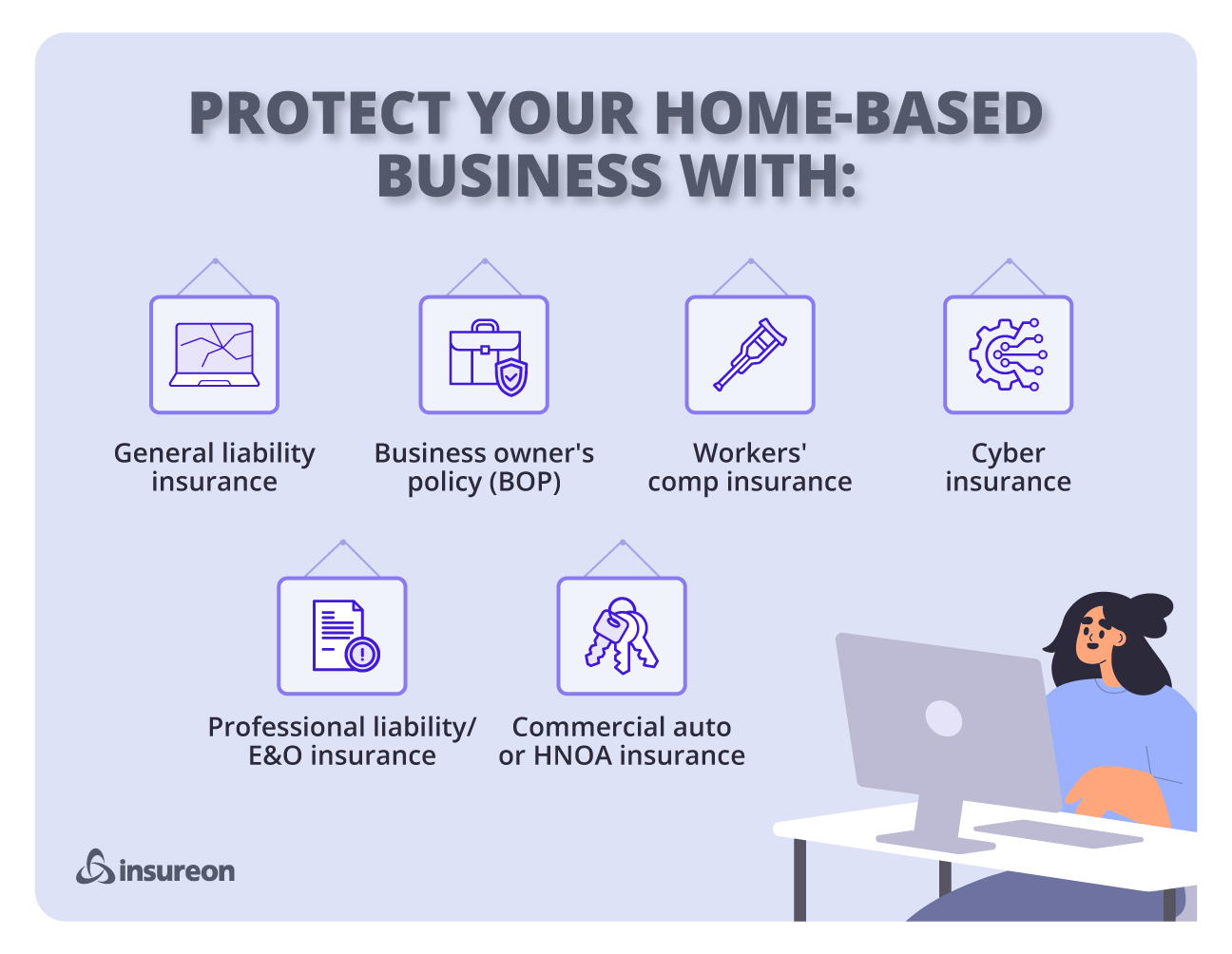
Top home businesses we insure
Recommended home-based business insurance policies
A lawsuit could devastate a small home-based business. Gain protection against business liabilities with the right policies for your unique risks.
General liability insurance
A general liability policy covers the basic risks of running a home office, including customer injuries. Commercial leases often require this insurance coverage.
- Customer bodily injuries
- Customer personal property damage
- Libel and other advertising injuries
Business owner’s policy
A business owner's policy, or BOP, is a cost-effective way for individuals who work from home to buy general liability coverage and commercial property insurance together.
- Customer injuries
- Customer property damage
- Business property coverage
Professional liability insurance
This policy covers lawsuits related to the quality of your professional services, such as a bride suing a wedding planner for a mistake. It's also called errors and omissions insurance (E&O).
- Mistakes and oversights
- Failure to deliver services
- Missed deadlines
Commercial auto insurance
A commercial auto policy covers property damage and medical bills for accidents involving company vehicles. Most states require it for business-owned vehicles.
- Legal fees from auto accidents
- Vehicle theft and vandalism
- Weather damage
Workers' compensation insurance
Most states require workers' compensation for home businesses that have employees. It also protects sole proprietors from work injury costs that health insurance might deny.
- Employee medical expenses
- Disability benefits
- Lawsuits over employee injuries
Cyber insurance
Cyber liability insurance helps small business owners survive cyberattacks and data breaches. It's important for home businesses that handle credit cards and other sensitive data.
- Customer notification costs
- Fraud monitoring services
- Data breach investigations
How much does home-based business insurance cost?

Insurance companies consider several factors when determining home-based business insurance costs, including:
- Home business services offered
- Business equipment and property
- Number of employees
- Types of business insurance purchased
- Policy limits, deductibles, and exclusions

How do I get home-based business insurance?
It’s easy to find insurance for home-based businesses. Whether you’re in pet sitting or mobile grooming, a virtual assistant or a crafter, you’ll need to have some basic information about your business available.
Our application will ask you for your annual revenue and payroll, among other details. You can buy a policy online and get a certificate of insurance with Insureon in three easy steps:
- Complete a free online application.
- Compare free quotes and choose a policy.
- Pay for your policy and download a certificate for proof of insurance.
Insureon's licensed insurance agents work with top-rated U.S. providers to find the right types of coverage and liability limits for your home business, whether you run a lawn care business with several employees or an independent photography business.
Verified business insurance reviews
Hear from customers like you who purchased small business insurance.
Common questions about home-based business insurance
Do I need insurance to run a business from home?
Even if you’re starting out as a sole proprietor and working out of your home, you could still be held legally liable for any mishaps that happen on your business property, including your home office.
There might be more freedom when you work for yourself, but you're also exposed to risks unique to home business owners. Insurance can save you from financial catastrophe if something goes wrong, protect your costly business assets, and give you peace of mind.
Additionally, as your business grows, the right coverage will be necessary to comply with state laws, secure more clients for your company, and protect your business income.
What is the difference between homeowner's insurance and business insurance coverage?
When you're running a business from home, you need the right type of insurance. In some instances, a homeowner's policy will include minimal protection for your business property. However, you'll likely need a commercial property insurance policy to gain full protection in the event of a fire or theft.
Similarly, your home insurance won't cover legal or medical costs if a client visiting for business purposes slips and suffers an injury. For that, you'd need general liability insurance.
While some insurance providers can add a commercial rider to your homeowner's insurance to increase your coverage limits, it still wouldn't offer the same comprehensive coverage as a business insurance policy.
The best protection for home businesses is usually a business owner's policy, which bundles general liability and commercial property insurance at an affordable rate. Chat with an insurance agent to make sure your coverage matches your business needs.
Do I need commercial auto coverage if I have personal auto insurance?
As with a homeowner's insurance policy, your personal auto policy isn't designed for business use. If you get into an accident while driving your own car for work purposes, your insurer might deny the claim.
That means you'll need additional coverage for vehicles used for work. If your business owns the vehicle, it must be covered by commercial auto insurance. For rented, leased, and personal vehicles, you can buy hired and non-owned auto insurance (HNOA) to make sure you're covered in an accident.
When you buy any type of auto coverage, make sure it fulfills your state's requirements for auto liability insurance.
Are workers' comp claims covered by personal health insurance?
If you're an independent contractor, freelancer, or home-based business owner with no employees, you're generally not legally required to carry workers' comp for yourself. Most states do require businesses with one or more employees to provide workers' comp, but there are exceptions.
However, personal health insurance policies often contain language that excludes coverage for work-related injuries and illnesses. It also won’t cover your lost income if you’re injured on the job and unable to work for a while.
A workers’ compensation insurance policy makes sure you, and any injured workers you may have, are covered for both medical bills and disability benefits during recovery.
What other insurance policies should home-based businesses carry?
There are several additional types of insurance that home-based businesses should consider including in their risk management plan:
Fidelity bonds, a type of surety bond, provide reimbursement if one of your employees commits fraud, theft, or forgery against a client or your business. They're often required by client contracts.
Business income insurance, also called business interruption coverage, offsets your loss of income if your business is forced to close because of a covered peril, such as a fire or storm. These funds will help cover your normal operating expenses until you can resume business operations.
Product liability insurance covers your legal expenses if someone claims that a product you sold, made, or distributed caused an injury or property damage. If you sell, make, or distribute products, you likely need this policy.
Cottage food insurance is a crucial policy for home-based food businesses. This coverage will protect your cottage food business from third-party claims of injury or damage, and may also be required to sell your goods locally and at events.
Employment practices liability insurance (EPLI) safeguards your business from lawsuits over employment-related issues, such as an employee claiming their civil rights were violated or they were unable to complete their work in a fair environment. This coverage (and business income coverage) can often be added to a BOP.
Read our blog posts

Selling baked goods from your home offers enormous flexibility and autonomy. However, similar to a traditional small business, you'll still need to get insurance for protection against the many types...



Want free expert advice right in your inbox?
By entering your email address and subscribing, you agree to our Terms of Use and Privacy Policy






























